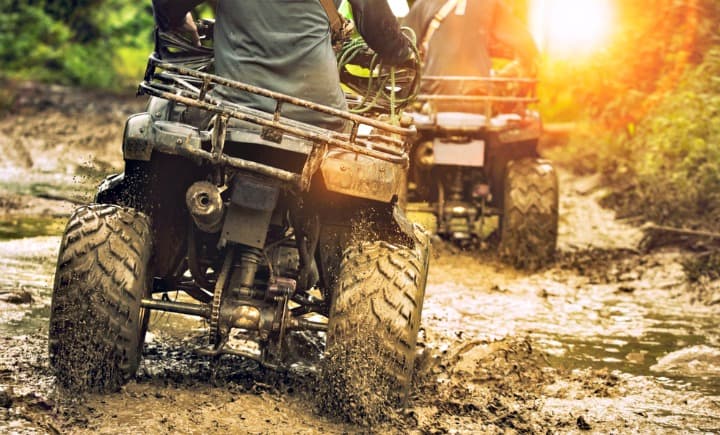What Type of Insurance Do You Need for an ATV?

Off-road vehicles, such as four-wheelers and dirt bikes, offer the thrill of riding beyond the main roads and speeding along scenic trails. But with that thrill comes risk. And where there’s risk, there’s a need for insurance.
Off-road vehicles usually require specialty insurance to protect against property damage, injury, liability and other incidents. The insurance for all-terrain vehicles, dirt-bikes and other off-road vehicles is similar to what you would need to insure a motorcycle, says Jim Witters, managing editor for the American Motorcyclist Association.
RELATED: 5 Insurance Claims That Rise With Temperatures
“The coverage you must have depends largely on the off-highway vehicle registration requirements in your state. But a general rule of thumb is that you should not expect your homeowner’s policy to provide any coverage — theft, liability or otherwise — for a recreational vehicle, including dirt bikes and ATVs,” Witters says.
Policies for off-road vehicles are generally less expensive than motorcycle insurance and typically offer coverage such as liability insurance for bodily injury or property damage, comprehensive, collision and uninsured/underinsured rider coverage.
Check your homeowners policy for ATV coverage
If your homeowners policy does provide coverage for your ATV, chances are the protection will be limited. Your homeowners policy might cover your ATV when you’re riding on your own property. But if you plan to ride anywhere else, you will probably need a separate policy.
“Your homeowners policy might not cover your ATV if you ride it off your own property,” says Janet Ruiz, spokeswoman for the Insurance Information Institute.
Most homeowners policies exclude motorized vehicles, and that includes off-road vehicles and ATVs. However, this exclusion stipulates that the vehicles need to be registered, which ATVs are not. If your policy does cover your ATV, there may be coverage limits or a high deductible, meaning you only have partial coverage.
And even if your policy covers your off-road vehicle, you will still need separate liability coverage in case you injure yourself or someone else.

Know your state’s ATV laws
Laws governing ATVs and off-road vehicles vary from state to state, and some of those laws dictate insurance requirements. For example, many states require insurance if you’re operating your off-road vehicle on state-owned land, such as in a state park.
The American Motorcyclist Association State Motorcycle Laws database is one resource for up-to-date information on the laws governing on-highway and off-highway motorcycles.
“If a state requires registration of off-highway vehicles, there may be insurance requirements that accompany registration,” Witters says. “In addition, some facilities may ask for proof of liability and/or medical coverage before they allow an ATV or dirt bike owner to ride on their property.”
The purpose of off-road vehicle insurance is just that — to cover vehicles that ride off roads and highways. Many insurers specify that coverage is only for off-road use. If you ride on public roads, insurers will not pay damages. Plus, most states outlaw the use of off-road vehicles on public roads and highways.
Off-roading isn’t limited to ATVs and dirt bikes. Many people like to take vehicles like pickup trucks, SUVs or military vehicles out for rides down dirt paths and trails. But even if you have auto insurance, your policy might not cover you if you get into an accident or damage your car while off-roading.
If you regularly take your car or truck out for rides off the main roads, check with your insurer to see if you need a separate policy for off-roading.
Tips for lowering ATV insurance
As with any other type of insurance, there are factors that can affect your off-road vehicle insurance rate — and steps you can take to lower your rates.
- Talk value with your agent. If you are buying insurance for an ATV or dirt bike, talk to your agent about the value of the vehicle and your options for coverage. “If you have added equipment, such as expensive upgrades, be sure the motorcycle or ATV coverage includes the cost of replacing those items,” Witters says.
- Stick with the same insurer. Many insurers offer multi-policy discounts. So if you already have your auto insurance policy with one company, you might save money by adding an ATV policy.
- Ride with caution. If you have violations on your driving record or a claim on your ATV insurance policy, your rates will be higher
- Choose wisely. Before you even buy an off-road vehicle, consider how the type of vehicle you choose might affect your insurance premium. For example, ATVs with higher engine capacity, and thus considered more aggressive, usually cost more to insure, Ruiz says. “It’s important to know that ahead of time if the price of insurance is a concern to you,” she says.
